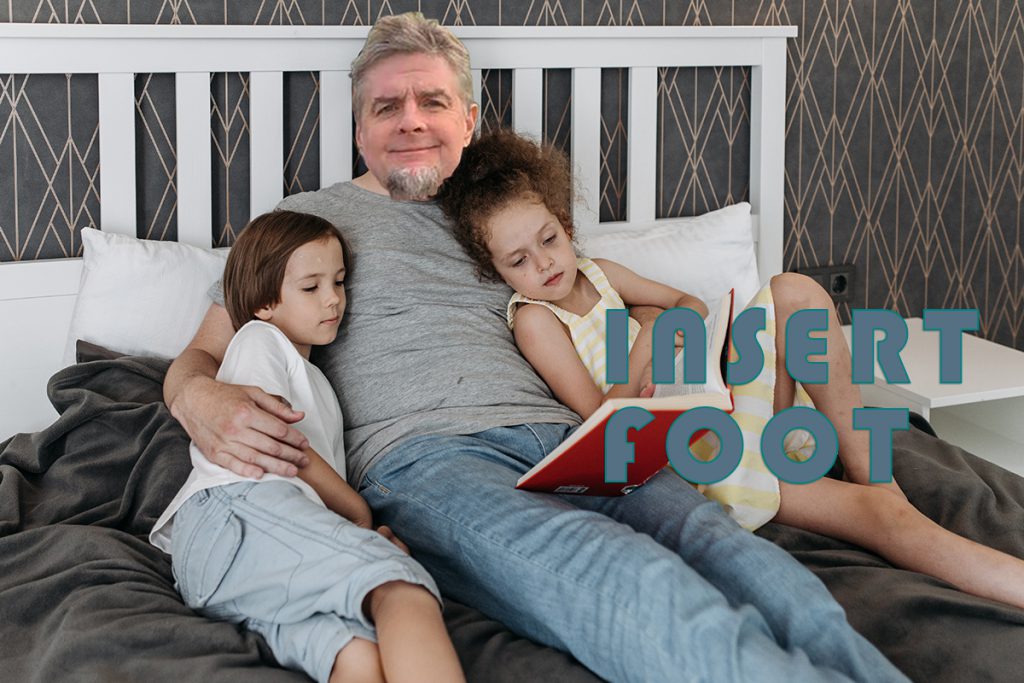Insert Foot: “Flowers for Algernon,” more culture old people should force-feed children

“Reimagining” of Insert Foot reading “Flowers for Algernon” to two of his daughters. Original photo: Pavel Danilyuk/Pexels.
My 13-year-old daughter slapped down a stapled-together stack of papers in front of me recently, announcing she’d read “Flowers for Algernon” and wanted to discuss.
Holy cow.
I was thrilled. Not only was she talking about classic literature, she actually enjoyed a book – though it didn’t look like a book – I read at her age.
So we discussed, which felt like a wonderful dream, since about a year ago she told me she didn’t read books anymore. She said so while staring down into her phone and pushing buttons, also pushing her father into a near-panic.
When I complained about this to her older sister – whom we’ll call Olivia, because that’s her name – Olivia also casually mentioned she didn’t read books anymore, either. She then went back to watching TikTok videos of people she didn’t know telling her how to run her life.
I wasn’t happy.
This isn’t why I bought my daughters all those Skippyjon Jones books (which I really bought for all of us, because they’re so hilarious). I used to have a rule, which was anytime my kids wanted a book from a store, they got it. I actually had to impose book limits, causing arguments I would lose because why wouldn’t I buy five books instead of three if it meant my kids would want to go to college instead of taking drugs?
Well … it made sense then. I’m just saying, if my kids don’t read books, the internets owe me a lot of money for ruining my plan.
Not reading wasn’t why I gifted my daughters some of my favorite books from when I was a kid. It wasn’t why I came home one day to find my old copy of “Fahrenheit 451” scattered in about as many pieces all over my yard.
I’d lent it to my eldest, who now lives with a male model in Spain (which has nothing to do with books but is fun to say) and was probably 13 at the time. She, in turn, accidentally lent it to the dog.
But that was fine as long as they wanted books. It was a different time. People still used pagers. And you couldn’t InstaSnapFaceTweet on pagers.
By the way, can you imagine that only 20 or so years ago we carried little boxes that periodically told us to go find something called a payphone and use our own money to call someone back … on a device we picked up and pressed against our faces after other people pressed it against their faces, without drenching it in a bottle of disinfectant first?
Anyway, back here in 2022, I wonder how I’ve failed as a parent. Why is a 13-year-old reading a book such a big deal?
I’m sure I’m not the only parent who feels this way. Allow me to overwhelm you with a bunch of secondhand statistics to show how smart I am:
People aged 15 to 44 in the U.S. spend fewer than 10 minutes a day reading, compared to 44 minutes a day for people 75 and over, according to Bureau of Labor Statistics. That isn’t to say I’m 75. I’m not even close, which really isn’t the point here.
Anyway, 80 percent of teenagers don’t read for pleasure on a daily basis anymore, according to the American Psychological Association, which is made up of a lot of people who are smarter than us, who say our rotten kids spend way more time on social media.
In case you haven’t read … just about every study from reputable research groups say there are strong correlations between reading, academic performance and general brain power. If you’ve seen some not-fake news over the past five years, you understand that’s in short supply right now.
The American Academy of Pediatrics says there’s a strong association between young children being exposed to regular reading at home and activation in areas of the brain involved in language association (if you don’t remember language, it’s that noise children make in their mouths when asking their parents to buy them a new video game). Kids who read 20 minutes a day score better than 90 percent of their peers on standardized testing.
That means you can say your kids are smarter than everyone else’s kids.
So reading is really good for kids. Most importantly, it means that if parents can somehow find ways to force their children to read books, that makes them (us) really good parents.
Sounds like a win-win for all of us.
Follow music critic Tony Hicks at Twitter.com/TonyBaloney1967.
